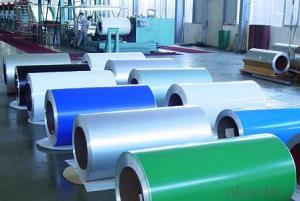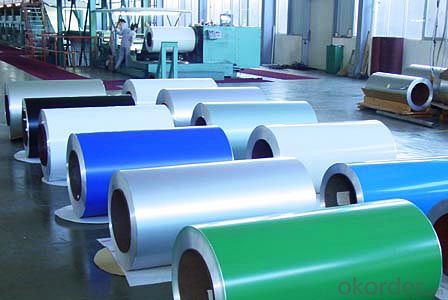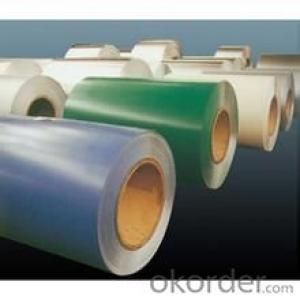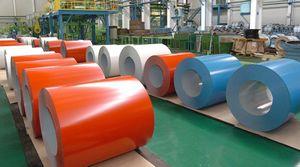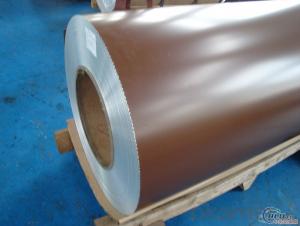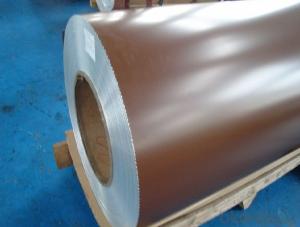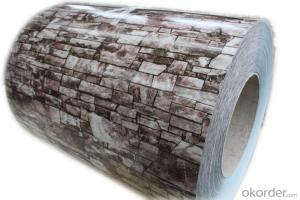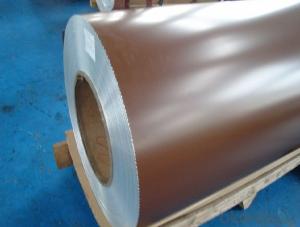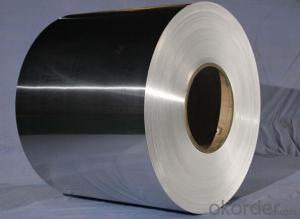Customized 3003 Aluminum Coil with Aluminium Power Coating and PVDF Dupont Paint
- Loading Port:
- Shanghai
- Payment Terms:
- TT OR LC
- Min Order Qty:
- 5 m.t.
- Supply Capability:
- 2000 m.t./month
OKorder Service Pledge
OKorder Financial Service
You Might Also Like
Specification
Structure of Aluminium Power Coating with PVDF Dupont Paint Description:
Coated aluminum coil/sheet are of a wide range of colors, which gives wonderful appearance no matter in residential and commercial constructions of great exhibition centers.
The coated aluminum coil/sheet have been widely used in the fields of construction and decoration( garage doors, ceiling etc.), electronic appliances, lighting decoration, air-condition air pipes, sandwich panels and drainages etc.
Main Features of the Aluminium Power Coating with PVDF Dupont Paint:
1) High flexibility
2) Impact resistance
3) Excellent weather-proof durability
4) Anti-ultraviolet
5) High erosion resist
Images of the Aluminium Power Coating with PVDF Dupont Paint:
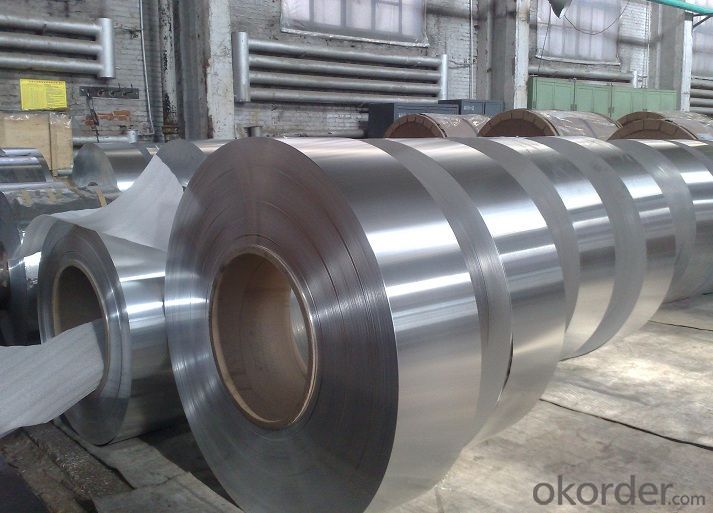
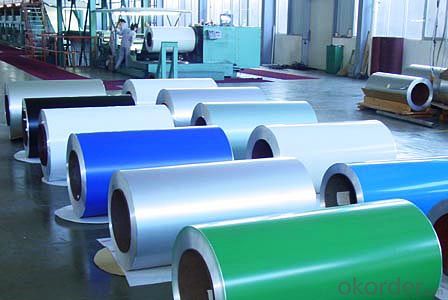
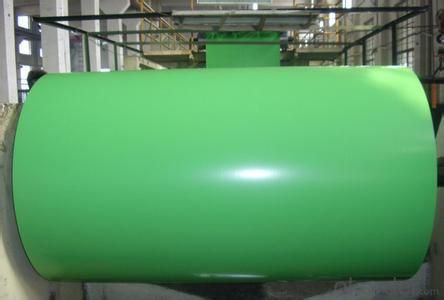
Aluminium Power Coating with PVDF Dupont Paint Specification:
FAQ:
a.What is monthly capacity
---CNBM is one stated own company and our monthly capacity is about 2000tons.
b. Now which countries do you export your goods?
---Now we export to South East Asia,Africa, North America,South America ect.
- Q: Explain the distinctions among various welding equipment used specifically for joining aluminum coils.
- <p>Different types of welding equipment for aluminum coils include Gas Tungsten Arc Welding (GTAW), Gas Metal Arc Welding (GMAW), and Resistance Welding (RW). GTAW, also known as TIG welding, uses a non-consumable tungsten electrode and produces high-quality welds with minimal distortion. GMAW, or MIG welding, uses a continuous wire feed as the electrode and is faster but may not be as precise. Resistance Welding involves using electrical current to heat the metals at the joint, which is quick and efficient but not suitable for all aluminum alloys. Each method has its advantages and is chosen based on factors like weld quality, speed, and the specific aluminum alloy being welded.</p>
- Q: What are the different coil coating technologies used for aluminum coils?
- There are several different coil coating technologies used for aluminum coils, including roll coating, spray coating, and brush coating. Roll coating involves applying a layer of paint or coating onto the aluminum coil using a roller. Spray coating involves spraying the paint or coating onto the coil using a spray gun. Brush coating involves manually applying the paint or coating onto the coil using a brush. Each of these technologies has its own advantages and is suitable for different applications and desired finishes.
- Q: What happened to the aluminum coil coming out of the annealing furnace?
- There is oil on the aluminum coil and the annealing time is too long.
- Q: Can aluminum coils be used for thermal insulation purposes?
- No, aluminum coils cannot be used for thermal insulation purposes. Aluminum is a highly conductive metal, meaning it easily transfers heat. Therefore, using aluminum coils as thermal insulation would actually promote heat transfer rather than preventing it. For effective thermal insulation, materials with low thermal conductivity, such as fiberglass, foam, or mineral wool, are commonly used. These materials create a barrier that limits heat transfer, keeping the desired temperature within a space.
- Q: Can aluminum coils be used in water treatment plants?
- Yes, aluminum coils can be used in water treatment plants. Aluminum is a corrosion-resistant metal that is widely used in various industrial applications, including water treatment. Aluminum coils are often used in heat exchangers and condensers, where they help transfer heat efficiently. In the context of water treatment plants, aluminum coils can be used in several processes. For example, they can be utilized in cooling towers to remove heat from the water by circulating it over the coils. The aluminum coils facilitate the transfer of heat from the water to the surrounding air, cooling it down in the process. Additionally, aluminum coils can be used in the construction of evaporators, where they aid in the evaporation of water during the treatment process. The coils are typically designed to have a large surface area, maximizing the contact between the water and the aluminum surface, which enhances the evaporation efficiency. Furthermore, aluminum coils can also be employed in the construction of air handling units (AHUs) in water treatment plants. AHUs help control the temperature, humidity, and air quality in the facility. Aluminum coils play a crucial role in AHUs by cooling or heating the air passing through them, contributing to the overall efficiency of the system. It is worth mentioning that the compatibility of aluminum with the specific water being treated is an important consideration. Some waters, such as those with low pH or high levels of certain chemicals, can cause corrosion or chemical reactions that may affect the performance or durability of aluminum coils. Therefore, it is crucial to assess the water composition and consult with experts or manufacturers to ensure the suitability of aluminum coils for a particular water treatment application.
- Q: where's the best place to look for aluminum not cans
- TRY A LOCAL HARDWARE STORE
- Q: Is it possible to use aluminum coils in the construction of a solar charger or battery pack?
- <p>While aluminum coils can be used in various electrical applications due to their conductivity, they are not typically used in solar chargers or battery packs. Solar chargers and battery packs usually require materials with higher conductivity and specific properties for efficient energy transfer and storage. Copper is more commonly used for wiring in these devices due to its superior conductivity compared to aluminum. Aluminum may not provide the necessary efficiency and could lead to energy loss. For the best performance in solar chargers and battery packs, it's recommended to use materials specifically designed for these applications, such as high-quality copper wiring and appropriate battery cells.</p>
- Q: I was wandering, if your spear's shaft is made of aluminum, does that have any strength to it, i mean, say you had to block with the shaft, would a weapon break through like your basic sword or basic axe, i don't mean big heavy swords and axes, but like average ones, could it break through an aluminum shaft of a spear?
- From my understanding aluminum weapons are only for exhibitions and never for anything close to real, let alone impact. Aluminum can be a strong/durable metal, but in the end it can hardly hold up against wood like pine, let alone oak. There's also here-say about aluminum shattering. I don't really know what that's about, but I have heard a rumor that about some doing so, whatever the extend of shattering really means. I wouldn't bother with aluminum when there's very fine woods that can be used instead. Aluminum is also cheap and it's said you get what you pay for. Personally, I'd forget aluminum and go with a hard wood.
- Q: What are the ideal materials for crafting a lampshade and why are they preferred?
- <p>The best material for making a lampshade depends on the desired aesthetic and functional requirements. Fabric is often preferred for its ability to diffuse light and provide a warm glow, with materials like cotton or linen being popular choices for their durability and texture. For a more modern look, materials like acrylic or glass can be used, offering a sleek appearance and the potential for more direct light. Paper is also a good option for its cost-effectiveness and the variety of textures and colors available. Ultimately, the best material is one that complements the lamp's design and the room's d茅cor while fulfilling the necessary light diffusion and safety requirements.</p>
- Q: I have completely disassembled my aluminum bass boat and it is being sandblasted.I am restoring the boat and will be giving it a new paint job.What do you recommend in the way of primer,paint or anything else I need to know.I just don,t want to mess it up by using the wrong thing.Best answer gets a fishing trip in the same boat we are talking about. If you can make it here I will put you on some fish.Catfish,bream,crappie,bass or even saltwater fish.
- Whatever okorder
Send your message to us
Customized 3003 Aluminum Coil with Aluminium Power Coating and PVDF Dupont Paint
- Loading Port:
- Shanghai
- Payment Terms:
- TT OR LC
- Min Order Qty:
- 5 m.t.
- Supply Capability:
- 2000 m.t./month
OKorder Service Pledge
OKorder Financial Service
Similar products
Hot products
Hot Searches
Related keywords
